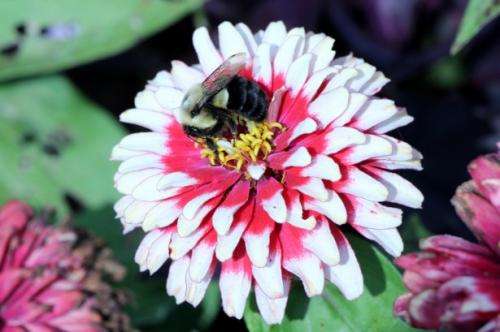Pesticides alter bees' brains, making them unable to live and reproduce adequately

In research report published in the May 2015 issue of The FASEB Journal, scientists report that a particular class of pesticides called "neonicotinoids" wreaks havoc on the bee populations, ultimately putting some crops that rely on pollination in jeopardy. Specifically, these pesticides kill bee brain cells, rendering them unable to learn, gather food and reproduce. The report, however, also suggests that the effects of these pesticides on bee colonies may be reversible by decreasing or eliminating the use of these pesticides on plants pollenated by bees and increasing the availability of "bee-friendly" plants available to the insects.
"Our study shows that the neonicotinoid pesticides are a risk to our bees and we should stop using them on plants that bees visit," said Christopher N. Connolly, Ph.D., a researcher involved in the work from the Medical Research Institute at the Ninewells Medical School at the University of Dundee in Dundee, UK. "Neonicotinoids are just a few examples of hundreds of pesticides we use on our crops and in our gardens. Stop using all pesticides in your garden and see insect damage as a success. You are providing for your native wildlife. Nasty caterpillars grow into beautiful butterflies."
To make their discovery, Connolly and colleagues fed bees a sugar solution with very low neonicotinoid pesticide levels typically found in flowers (2.5 parts per billion) and tracked the toxins to the bee brain. They found that pesticide levels in the bees' brains were sufficient to cause the learning cells to run out of energy. Additionally, the brain cells were even vulnerable to this effect at just one tenth of the level present. When the ability of the bee's brain to learn is limited, the bee is unable to master key skills such as recognizing the presence of nectar and pollen from the smell emitted from flowers. In addition, scientists fed bumblebee colonies this same very low level of pesticide in a remote site in the Scottish Highlands where they were unlikely to be exposed to any other pesticides. They found that just a few of the exposed colonies performed well, colonies were smaller, and nests were in poor condition with fungus taking over. This further suggests that bumblebees exposed to this type of pesticide become poor learners, become unable to properly gather food, and become unable to properly nurture the next generation of bees.
"It is ironic that neonicotinoids, pesticides developed to preserve the health of plants, ultimately inflict tremendous damage on plant life," said Gerald Weissmann, M.D., Editor-in-Chief of The FASEB Journal. "These chemicals destroy the insect communities required by plants for their own reproduction."
More information: Christopher Moffat, Joao Goncalves Pacheco, Sheila Sharp, Andrew J. Samson, Karen A. Bollan, Jeffrey Huang, Stephen T. Buckland, and Christopher N. Connolly. Chronic exposure to neonicotinoids increases neuronal vulnerability to mitochondrial dysfunction in the bumblebee (Bombus terrestris). FASEB J. DOI: 10.1096/fj.14-267179
Journal information: FASEB Journal


















